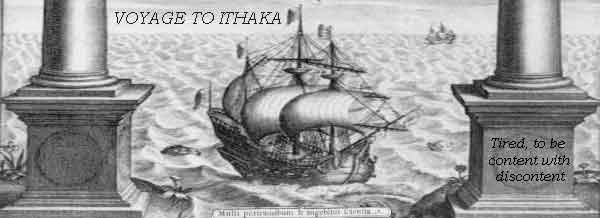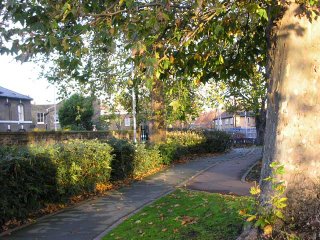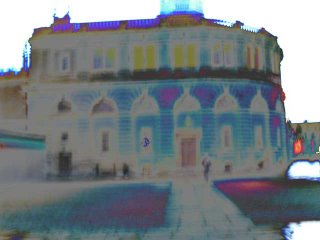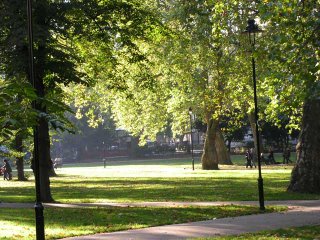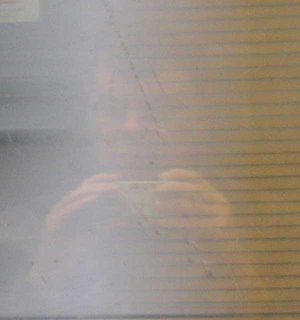Wednesday, November 29, 2006
Monday, November 27, 2006
Dreaming
I very rarely dream, or at least rarely remember my dreams. So I'm envious of those who have exciting dream-lives. But I did dream last night.
I dreamt that I had woken up. Not knowing what the time was, and anxious that my 3am insomnia might have caused me to sleep in and miss my early morning lecture, I stretched out to turn the bedside lamp on. Nothing happened: I realised that in my haste I had somehow broken it. For a reason I don't understand, my next step was to unplug this lamp, which I did without getting out of bed (impossible). At this point my eyes acclimatised to the dark and I realised that I had instead unplugged my radio, which would necessitate a ten-minute resetting of the clock and all the tuning. Feeling thoroughly annoyed, I realised that I still didn't know the time. I remember nothing more, but when I woke up (probably a few minutes later, if not immediately) I was surprised to find lamp and radio working.
If this is the kind of dream I'm going to have, perhaps it's lucky I rarely dream.
I dreamt that I had woken up. Not knowing what the time was, and anxious that my 3am insomnia might have caused me to sleep in and miss my early morning lecture, I stretched out to turn the bedside lamp on. Nothing happened: I realised that in my haste I had somehow broken it. For a reason I don't understand, my next step was to unplug this lamp, which I did without getting out of bed (impossible). At this point my eyes acclimatised to the dark and I realised that I had instead unplugged my radio, which would necessitate a ten-minute resetting of the clock and all the tuning. Feeling thoroughly annoyed, I realised that I still didn't know the time. I remember nothing more, but when I woke up (probably a few minutes later, if not immediately) I was surprised to find lamp and radio working.
If this is the kind of dream I'm going to have, perhaps it's lucky I rarely dream.
Looking back during insomnia
As a teenager I loved this verse, which I discovered in one of Martin Gardner's "Mathematical Games" books:
A bit beyond perception's reach
I sometimes believe I see
That life is two locked boxes, each
Containing the other's key.
A bit beyond perception's reach
I sometimes believe I see
That life is two locked boxes, each
Containing the other's key.
Piet Hein
It no longer seems meaningful. Perhaps I should have explored other ways of going beyond perception's reach.
Sunday, November 26, 2006
Sundays
Another bloody useless Sunday, everything taking ten times longer than it should. Why can't I work effectively before the deadline?
Wednesday, November 22, 2006
Favourite mathematical illustrations
Number 2 of an occasional series
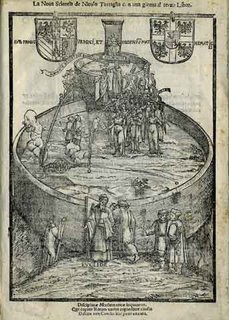 Title page of Nicolo Tartaglia, La Nova Scientia, Venice, 1550
Title page of Nicolo Tartaglia, La Nova Scientia, Venice, 1550Euclid guards the entrance to a walled garden within which Tartaglia is surrounded by figures including Geometry, Arithmetic, Music and Astronomy. This garden leads to another, in which Aristotle and Plato appear in front of the enthroned figure of Philosophy. A cannon represents one of the themes of Tartaglia's book, and reminds us that the development of mathematics, like other technologies, was often driven by military purposes.
Disciplinae Mathematicae loquuntur.
Qui cupitis Rerum varias cognoscere causas
Discite nos: Cunctis hac patet vna via.
Tuesday, November 21, 2006
Half of a Yellow Sun
 I've just read this powerful novel by a young Nigerian writer. The characters' middle-class affluence of the early sixties is contrasted with their situation in the war a few years later. I was too young to fully comprehend the horrors of the Biafran conflict at the time. This book brings home the unpredictability of life, the ease with which we humans descend into conflict and our remarkable inability to hang onto peace. The terrible events described in this book happened almost forty years ago: in the intervening years similar things have taken place in Vietnam, Rwanda, the Balkans, Iraq and many other lands.
I've just read this powerful novel by a young Nigerian writer. The characters' middle-class affluence of the early sixties is contrasted with their situation in the war a few years later. I was too young to fully comprehend the horrors of the Biafran conflict at the time. This book brings home the unpredictability of life, the ease with which we humans descend into conflict and our remarkable inability to hang onto peace. The terrible events described in this book happened almost forty years ago: in the intervening years similar things have taken place in Vietnam, Rwanda, the Balkans, Iraq and many other lands.On finishing this book I have renewed respect for my parents and grandparents who lived through wars which they did not know whether they would survive.
Peace is worth struggling for. We must resist the politicians who too readily sacrifice it.
Saturday, November 18, 2006
Bloomsbury, Alchemy and Ursi Carmina
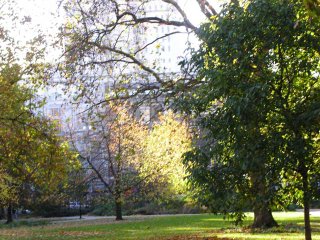 Back in Russell Square. Again the sun warm on my back, but fallen leaves everywhere and a much more autumnal feel.
Back in Russell Square. Again the sun warm on my back, but fallen leaves everywhere and a much more autumnal feel.Went to hear a paper by William Newman on Newton's alchemy. It seems scholars are only now beginning to understand how Newton planned his experiments and investigations.
Then on to St Giles, Cripplegate for the London Concord Singers' 40th anniversary concert. Sitting next to a statue of Milton (whose church this was) we heard Handel, Mozart, two English composers from the beginning of the 20th century, and the World Premiere of Robert Hugill's Ursi Carmina. The choir on fine form - thoroughly enjoyable:
Dies ille, dies Lunae
Semper venit opportune
Rogo vos et quaero id
Quid est quod et quod est quid?
Alexander Lennard, after A.A. Milne
* * * * *
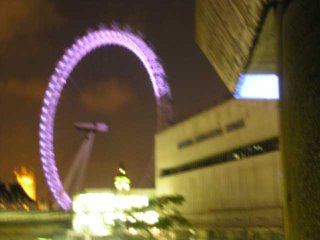
I have to confess to rather enjoying the coloured floodlights at the South Bank (see previous photos posted here). Here's a rather blurred picture of the London Eye from Waterloo Bridge, in early evening.
Friday, November 17, 2006
Looking through windows
Earlier this week, in a meeting, I was distracted by background noise - like chatter leaking from the earphones of someone listening to loud music. Then as I looked through the window at the russet treas with their autumn leaves (yes, it was an absorbing meeting) I realised that what I was hearing was birdsong.
Bloody birds, interfering with important meetings!
Then today on the bus home, with heavily steamed up windows (yes, it has been raining all day again: there are pools of water along all the streets of Lewisham), with nothing visible outside except blurred streetlights and car headlights, losing track of the journey, rather disoriented.
I love rainy autumn evenings as the light goes - childhood memories of walking home from football matches with my father at a quarter to five on Saturday, with a warm fire and hot meal waiting and happy because my team had won.
Bloody birds, interfering with important meetings!
Then today on the bus home, with heavily steamed up windows (yes, it has been raining all day again: there are pools of water along all the streets of Lewisham), with nothing visible outside except blurred streetlights and car headlights, losing track of the journey, rather disoriented.
I love rainy autumn evenings as the light goes - childhood memories of walking home from football matches with my father at a quarter to five on Saturday, with a warm fire and hot meal waiting and happy because my team had won.
Thursday, November 16, 2006
The rain it raineth ev'ry day
Well, an exaggeration, but it certainly rained heavily today - not continuously, but every time I went out I got wet.
I listened a couple of nights ago to a CD containing Howard Skempton's rather lovely setting of Feste's song:
When that I was and a little tiny boy
With hey, ho, the wind and the rain,
A foolish thing was but a toy,
For the rain it raineth ev'ry day.
But when I came to man's estate,
With hey, ho, the wind and the rain,
'Gainst knaves and thieves men shut their gate,
For the rain it raineth ev'ry day.
But when I came, alas, to wive,
With hey, ho, the wind and the rain,
By swagg'ring could I never thrive,
For the rain it raineth ev'ry day.
But when I came unto my beds,
With hey, ho, the wind and the rain,
With toss-pots still had drunken heads,
For the rain it raineth ev'ry day.
A great while ago the world began,
With hey, ho, the wind and the rain,
But that's all one, our play is done,
And we'll strive to please you ev'ry day.
Since listening to it I've been unable to get out of my head, not Skempton's setting, but Morley's famous one. (I'e just listened to the Skempton again, and they're not similar.) Curious how word-based is my musical memory.
I listened a couple of nights ago to a CD containing Howard Skempton's rather lovely setting of Feste's song:
When that I was and a little tiny boy
With hey, ho, the wind and the rain,
A foolish thing was but a toy,
For the rain it raineth ev'ry day.
But when I came to man's estate,
With hey, ho, the wind and the rain,
'Gainst knaves and thieves men shut their gate,
For the rain it raineth ev'ry day.
But when I came, alas, to wive,
With hey, ho, the wind and the rain,
By swagg'ring could I never thrive,
For the rain it raineth ev'ry day.
But when I came unto my beds,
With hey, ho, the wind and the rain,
With toss-pots still had drunken heads,
For the rain it raineth ev'ry day.
A great while ago the world began,
With hey, ho, the wind and the rain,
But that's all one, our play is done,
And we'll strive to please you ev'ry day.
Since listening to it I've been unable to get out of my head, not Skempton's setting, but Morley's famous one. (I'e just listened to the Skempton again, and they're not similar.) Curious how word-based is my musical memory.
Tuesday, November 14, 2006
H. H. Munro (1870-1916)
I've just been to a talk about Hector Hugh Munro, who died on the Somme 90 years ago tonight. His short stories, written under the pen-name Saki, were favourite reading when I was a teenager.
The first I came across was Sredni Vashtar, which we read at school. It bored me, and I disliked the story. For some reason this didn't stop me picking up The Chronicles of Clovis when I found it on my grandparents' shelves, and after that these stories were my constant reading matter when I visited. I remember holidays in Girvan, pleasantly bored since deprived of my usual nerdish pursuits, sitting in the armchair by the window reading and re-reading Saki and Wodehouse.
And when like her, oh, Saki, you shall pass
Among the Guests Star-scatter'd on the Grass,
And in your joyous errand reach the spot
Where I made One--turn down an empty Glass!
The first I came across was Sredni Vashtar, which we read at school. It bored me, and I disliked the story. For some reason this didn't stop me picking up The Chronicles of Clovis when I found it on my grandparents' shelves, and after that these stories were my constant reading matter when I visited. I remember holidays in Girvan, pleasantly bored since deprived of my usual nerdish pursuits, sitting in the armchair by the window reading and re-reading Saki and Wodehouse.
And when like her, oh, Saki, you shall pass
Among the Guests Star-scatter'd on the Grass,
And in your joyous errand reach the spot
Where I made One--turn down an empty Glass!
(Edward Fitzgerald, after Omar Khayyam)
Monday, November 13, 2006
Sunday, November 12, 2006
The Monk and his Cat
I and Pangur Bán, my cat
'Tis a like task we are at;
Hunting mice is his delight
Hunting words I sit all night.
Better far than praise of men
'Tis to sit with book and pen;
Pangur bears me no ill will,
He too plies his simple skill.
'Tis a merry thing to see
At our tasks how glad are we,
When at home we sit and find
Entertainment to our mind.
Oftentimes a mouse will stray
In the hero Pangur's way:
Oftentimes my keen thought set
Takes a meaning in its net.
'Gainst the wall he sets his eye
Full and fierce and sharp and sly;
'Gainst the wall of knowledge I
All my little wisdom try.
When a mouse darts from its den,
O how glad is Pangur then!
O what gladness do I prove
When I solve the doubts I love!
So in peace our tasks we ply,
Pangur Bán, my cat, and I;
In our arts we find our bliss,
I have mine and he has his.
Practice every day has made
Pangur perfect in his trade;
I get wisdom day and night
Turning darkness into light
(Translated from the 8th century Irish Gaelic by Robin Flower, set to music, in different translations, by both Samuel Barber and Stephen Dodgson, and no doubt others.)
'Tis a like task we are at;
Hunting mice is his delight
Hunting words I sit all night.
Better far than praise of men
'Tis to sit with book and pen;
Pangur bears me no ill will,
He too plies his simple skill.
'Tis a merry thing to see
At our tasks how glad are we,
When at home we sit and find
Entertainment to our mind.
Oftentimes a mouse will stray
In the hero Pangur's way:
Oftentimes my keen thought set
Takes a meaning in its net.
'Gainst the wall he sets his eye
Full and fierce and sharp and sly;
'Gainst the wall of knowledge I
All my little wisdom try.
When a mouse darts from its den,
O how glad is Pangur then!
O what gladness do I prove
When I solve the doubts I love!
So in peace our tasks we ply,
Pangur Bán, my cat, and I;
In our arts we find our bliss,
I have mine and he has his.
Practice every day has made
Pangur perfect in his trade;
I get wisdom day and night
Turning darkness into light
(Translated from the 8th century Irish Gaelic by Robin Flower, set to music, in different translations, by both Samuel Barber and Stephen Dodgson, and no doubt others.)
Saturday, November 11, 2006
In the Face of History
 This exhibition at the Barbican Centre presents 22 European photographers, from Atget to Wolfgang Tillmans. I expected to be familiar with most of the work: I was wrong. Even for photographers I knew well (Atget, Kertesz, Doisneau, Sudek) I found much I hadn't known, including Kertesz's contact prints from the Great War. And many of the photographers I didn't know at all - Emmy Andriesse, Jitka Hanzlová, Sune Jonsson, Viktor Kolar, Henryk Ross, Inta Ruka, Christer Strömholm and S. I. Witkiewicz amongst others.
This exhibition at the Barbican Centre presents 22 European photographers, from Atget to Wolfgang Tillmans. I expected to be familiar with most of the work: I was wrong. Even for photographers I knew well (Atget, Kertesz, Doisneau, Sudek) I found much I hadn't known, including Kertesz's contact prints from the Great War. And many of the photographers I didn't know at all - Emmy Andriesse, Jitka Hanzlová, Sune Jonsson, Viktor Kolar, Henryk Ross, Inta Ruka, Christer Strömholm and S. I. Witkiewicz amongst others.It's a very powerful exhibition. Emmy Andriesse's photographs of the "Hunger Winter" of 1944 in Amsterdam and Henryk Ross's images of the L'odz ghetto are harrowing. In this context Atget's and Doisneau's photographs of the fortified zone of Paris carry extra weight. Boris Mikhailov and Viktor Kolar dissect communist Eastern Europe. Doisneau's images of the Resistance resonate with Ed van der Elsken's rebellious young people of the 50s and 60s. Christer Strömholm's pictures of transsexuals in the 1950s were quite new to me. War and the inevitabilty of an imminent war, persecution and madness (explored by Witkiewicz and Seiichi Furuya) present a depressing view of the last century.
So in many ways an appropriate exhibition to visit on Armistice Day. And stories of young Muslim children being attacked while praying at school, to take just one example from yesterday's newspaper, don't give one much optimism that lessons will ever be learnt.
But there is another side to the exhibition, with its emphasis on communities. Inta Ruka's photographs from Latvia, Annelies Štrba's family history, Chris Killip's sympathetic views of harsh lives in northeast England, and many of those mentioned above present also an inspiring view of our ability to live together and in harmony with nature. The work of Jitka Hanzlová, an exile who was able to return to her homeland after the Velvet Revolution, was particularly uplifting: her photographs of the Carpathian forest so evocative and optimistic.
I've rarely seen an exhibition which brings out such deep relationships between such apparently diverse bodies of work. I will look with different eyes now at every one of these photographers.
Housman for Remembrance Day
Heard on radio this morning David Wilson-Johnson and David Owen Norris performing Somervell's setting of this poem by A.E. Housman.
The lads in their hundreds to Ludlow come in for the fair,
There's men from the barn and the forge and the mill and the fold,
The lads for the girls and the lads for the liquor are there,
And there with the rest are the lads that will never be old.
There's chaps from the town and the field and the till and the cart,
And many to count are the stalwart, and many the brave,
And many the handsome of face and the handsome of heart,
And few that will carry their looks or their truth to the grave.
I wish one could know them, I wish there were tokens to tell
The fortunate fellows that now you can never discern;
And then one could talk with them friendly and wish them farewell
And watch them depart on the way that they will not return.
But now you may stare as you like and there's nothing to scan;
And brushing your elbow unguessed-at and not to be told
They carry back bright to the coiner the mintage of man,
The lads that will die in their glory and never be old.
Today should be a day of sorrowful memory. One of the many things for which I will not forgive Mrs Thatcher is that she turned it into a militaristic celebration.
The lads in their hundreds to Ludlow come in for the fair,
There's men from the barn and the forge and the mill and the fold,
The lads for the girls and the lads for the liquor are there,
And there with the rest are the lads that will never be old.
There's chaps from the town and the field and the till and the cart,
And many to count are the stalwart, and many the brave,
And many the handsome of face and the handsome of heart,
And few that will carry their looks or their truth to the grave.
I wish one could know them, I wish there were tokens to tell
The fortunate fellows that now you can never discern;
And then one could talk with them friendly and wish them farewell
And watch them depart on the way that they will not return.
But now you may stare as you like and there's nothing to scan;
And brushing your elbow unguessed-at and not to be told
They carry back bright to the coiner the mintage of man,
The lads that will die in their glory and never be old.
Today should be a day of sorrowful memory. One of the many things for which I will not forgive Mrs Thatcher is that she turned it into a militaristic celebration.
Wednesday, November 08, 2006
A childhood favourite
At Flores in the Azores Sir Richard Grenville lay,
And a pinnace, lke a flutter'd bird, came flying from far away:
'Spanish ships of war at sea! we have sighted fifty-three!'
Then sware Lord thomas Howard: ''Fore God I am no coward;
But I cannot meet them here, for my ships are out of gear,
And the half my men are sich. I must fly, but follow quick.
We are six ships of the line, can we fight with fifty-three?'
Then spake Sir Richard Grenville,: 'I know you are no coward;
You fly them for a moment to fight with them again.
But I've ninety men and more that are lying sick ashore.
I should count myself the coward if I left them, my Lord Howard
To these Inquisition dogs and the devildoms of Spain.'
and so on, for many more verses: The Revenge: A Ballad of the Fleet by Tennyson.
This was the first poem that I really liked, at secondary school - I must have been 12 or 13. I wrote an essay about it, one of the few essays I wrote with enthusiasm, with something to say. And my English teacher took it apart. I remember I had described the rhyming as "superb": he ridiculed me in class, saying "superb" is a word one might read in a football report in a newspaper, not a word for using in a serious essay. (He had correctly identified my usual reading matter.)
Iain MacLeod, you were an unconventional teacher. You made us think. I hated your English classes, and you didn't think much of me: you can have no idea how much you influenced me.
Much later, in the sixth form, I wrote an essay about Lucky Jim. It was the first time I felt I really understood the book I was writing about: I wrote what I thought was a brilliant dissection of the humour of the novel. As I wrote I remember thinking how at last I understood what my English class was about: instead of writing meaningless things about books I didn't understand, I'd finally got the point and written something worthwhile and significant.
It got the lowest mark of any of my essays.
And a pinnace, lke a flutter'd bird, came flying from far away:
'Spanish ships of war at sea! we have sighted fifty-three!'
Then sware Lord thomas Howard: ''Fore God I am no coward;
But I cannot meet them here, for my ships are out of gear,
And the half my men are sich. I must fly, but follow quick.
We are six ships of the line, can we fight with fifty-three?'
Then spake Sir Richard Grenville,: 'I know you are no coward;
You fly them for a moment to fight with them again.
But I've ninety men and more that are lying sick ashore.
I should count myself the coward if I left them, my Lord Howard
To these Inquisition dogs and the devildoms of Spain.'
and so on, for many more verses: The Revenge: A Ballad of the Fleet by Tennyson.
This was the first poem that I really liked, at secondary school - I must have been 12 or 13. I wrote an essay about it, one of the few essays I wrote with enthusiasm, with something to say. And my English teacher took it apart. I remember I had described the rhyming as "superb": he ridiculed me in class, saying "superb" is a word one might read in a football report in a newspaper, not a word for using in a serious essay. (He had correctly identified my usual reading matter.)
Iain MacLeod, you were an unconventional teacher. You made us think. I hated your English classes, and you didn't think much of me: you can have no idea how much you influenced me.
Much later, in the sixth form, I wrote an essay about Lucky Jim. It was the first time I felt I really understood the book I was writing about: I wrote what I thought was a brilliant dissection of the humour of the novel. As I wrote I remember thinking how at last I understood what my English class was about: instead of writing meaningless things about books I didn't understand, I'd finally got the point and written something worthwhile and significant.
It got the lowest mark of any of my essays.
L'Arpeggiata

I know I'm not meant to buy any more CDs, but when Christina Pluhar and L'Arpeggiata have a new release, how can I resist?
Powered by Castpost
Saturday, November 04, 2006
Thursday, November 02, 2006
One of Larkin's
This poem has been in my head for the last few days - I don't know why, it doesn't particularly reflect my mood.
Toads Revisited
Walking around in the park
Should feel better than work:
The lake, the sunshine,
The grass to lie on,
Blurred playground noises
Beyond black-stockinged nurses --
Not a bad place to be.
Yet it doesn't suit me,
Being one of the men
You meet of an afternoon:
Palsied old step-takers,
Hare-eyed clerks with the jitters,
Waxed-fleshed out-patients
Still vague from accidents,
And characters in long coats
Deep in the litter-baskets --
All dodging the toad work
By being stupid or weak.
Think of being them!
Hearing the hours chime,
Watching the bread delivered,
The sun by clouds covered,
The children going home;
Think of being them,
Turning over their failures
By some bed of lobelias,
Nowhere to go but indoors,
No friends but empty chairs --
No, give me my in-tray,
My loaf-haired secretary,
My shall-I-keep-the-call-in-Sir:
What else can I answer,
When the lights come on at four
At the end of another year?
Give me your arm, old toad;
Help me down Cemetery Road.
Toads Revisited
Walking around in the park
Should feel better than work:
The lake, the sunshine,
The grass to lie on,
Blurred playground noises
Beyond black-stockinged nurses --
Not a bad place to be.
Yet it doesn't suit me,
Being one of the men
You meet of an afternoon:
Palsied old step-takers,
Hare-eyed clerks with the jitters,
Waxed-fleshed out-patients
Still vague from accidents,
And characters in long coats
Deep in the litter-baskets --
All dodging the toad work
By being stupid or weak.
Think of being them!
Hearing the hours chime,
Watching the bread delivered,
The sun by clouds covered,
The children going home;
Think of being them,
Turning over their failures
By some bed of lobelias,
Nowhere to go but indoors,
No friends but empty chairs --
No, give me my in-tray,
My loaf-haired secretary,
My shall-I-keep-the-call-in-Sir:
What else can I answer,
When the lights come on at four
At the end of another year?
Give me your arm, old toad;
Help me down Cemetery Road.
Philip Larkin
